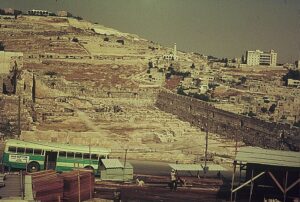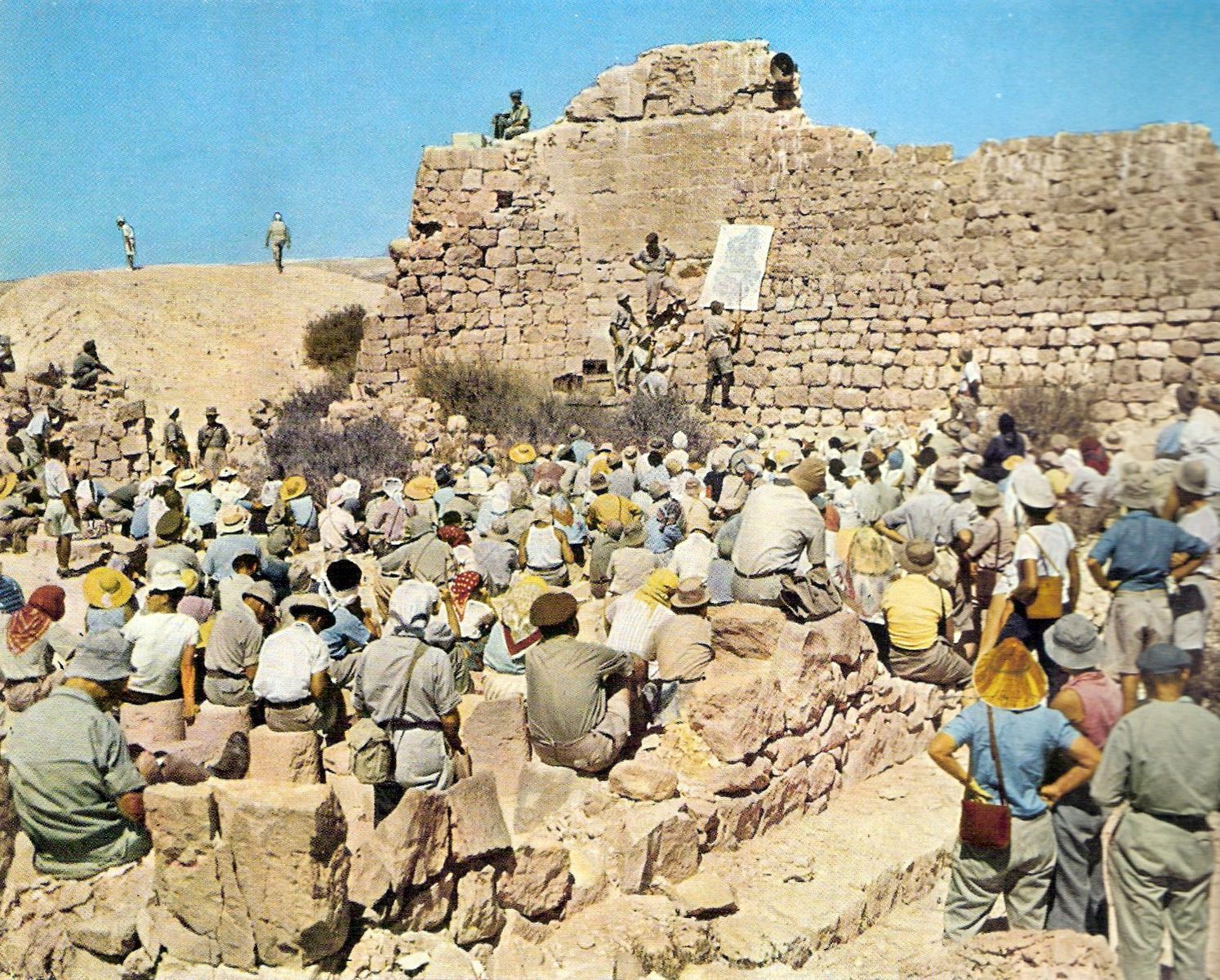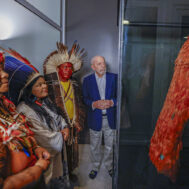“If we were to be locked in here and given food under the door, we could work five years nonstop without emerging – just on the material that’s here. If they were to bring everything that has already been published and hasn’t gotten to us yet, it would take 10 years.” Dr. Michael Saban, Director of Israel’s National Treasures Department.

Jerusalem – the archaeological garden, Pikiwiki Israel, CCA 2.5 generic license.
“Return with a click!” Program Brings in Thousands of Antiquities
The Law of the Israeli Antiquities Authority sets the terms under which citizens may own antiquities – and even trade in them, but the Israel Antiquities Authority (IAA) and Ministry of Heritage say many Israelis have antiquities in their homes that don’t meet the law’s criteria of ownership before 1989. A campaign offering the public an easy online way to let the heritage authorities know about undocumented items, “If it’s old – return it with a click!” generated thousands of responses in June 2023 and the IAA has extended it to accommodate the volume of returns. The IAA campaign makes clear that people who volunteer to return items face no legal consequences; they can drop them off at designated sites or for larger items, the IAA staff will come and pick them up.
The educational campaign is intended to bring out items collected in violation of Israeli law – in force since 1989 – and any others that the public wishes to be preserved and conserved by State heritage authorities. Yair Amitzur of the IAA told the Times of Israel that they have received “all types of pottery from all of the periods… bronze items, jewelry, metal tools…” A kibbutz returned a carved stone coffin found when its members were working in a stone quarry for the British 100 years ago, which they had used since as a bench. A diver turned in a fine bronze anchor, 1700 years old, that he’d found at Palmachim beach in 1996.
Coincidentally with the campaign, the Jewish News Syndicate reported that a 74 year old woman walking at the same beach this month spotted a 3,000-year-old Egyptian figurine made of baked clay. She contacted the IAA through its Facebook page, which examined the figurine and declared it to represent Hathor, a fertility goddess.

Antiquities Authority “Return with a Click!” Campaign ad.
According to the Times of Israel, a survey found that 15% of Israelis have some antiquities at home, a number that appears likely to be higher than in any other country. Many are unaware that their holdings could be unlawful, and others simply didn’t know that they could return objects without repercussions.
Since 1978, Israeli law has required that anyone who discovers an antiquity must notify the Director of the Antiquities Authority within 15 days. Antiquities found after passage of the Antiquities Authority Law in 1989 belong to the State of Israel. Dealers must have a license, keep detailed records and register objects for sale. Export requires written permission of the Director. Serious penalties apply to violating the law.
While private owners who own antiquities found before 1989 may keep them, they may be required to prove when they were acquired. Owners of antiquities of “national value” can be notified that their object is wanted for national collections and the State of Israel has the right to purchase it. The success of the public campaign to turn over antiquities, however, may place an additional burden on archaeologists tasked with cataloging antiquities in Israel.

Photo Benno Rothenberg, June 1956, National Library of Israel, CC BY 4.0 license.
Too Many Objects! Archaeologists Ask for Halt to Excavations
At the same time that the Antiquities Authority is urging the public to turn over any state-owned antiquities, Dr. Michael Saban, Director of the National Treasures Department says that the pace of archaeological excavation in Israel must stop or at least be slowed. His sentiment was echoed many times at the annual Archaeological Congress this May in Jerusalem. Israel is incredibly rich in historic and prehistoric sites and has had a singular public commitment to archaeological education and excavation since 1948. Israelis were encouraged to view archaeological discoveries as reinforcing historical ties to the land and many have volunteered as site workers for decades. Israel is also the most popular location for Middle Eastern archaeological excavation by foreign universities. “Rescue digs” to expose sites and recover antiquities are a regular part of construction for development and infrastructure, and these cannot be done with the painstaking care of a regular excavation.
The National Treasures Department, where the Israeli Antiquities Department stores objects, has 3.7 miles of shelves filled with objects from prehistoric times to the 1700s. Its staff works full time cataloging over 30,000 new items a year, but it is impossible to keep up with the flow of antiquities – or to begin to complete the vast numbers of objects from past excavations.
In Israel, where laws are followed by the vast majority of citizens, sites are usually well-protected. Israeli archaeologists say that under these circumstances, archaeological sites may be safer left underground.
Failure to publish scientific findings after excavation is a huge issue, according to Professor Aren Maeir of the Department of Land of Israel Studies and Archaeology at Bar-Ilan University. Maeir told Haaretz’s Nir Hasson,
“there are people who excavated for decades without publishing anything. If someone who’s 85 years old is still excavating, it’s clear to everyone that he won’t publish the finds, and there are many who have excavated beyond their ability to publish their work. With this in mind, I said two years ago that I was stopping large-scale digs. No more expeditions with 120 people, only point-specific projects. It’s important for everyone to excavate based on what they’re capable of publishing in their lifetime and no more than that.”

Archaeological finds, Ronnie Kenugsberg, Pikiwiki Israel, 2.0 Generic license.
There are insufficient funds to complete the research at state-mandated rescue archaeology sites. Over the last twenty years, this more restricted approach to archaeology has become widespread even among its fervent enthusiasts. Still, says Professor Raphael Greenberg of Tel Aviv University:
“Archaeologists have an insatiable appetite. Give them money and a shovel, and they’ll continue to dig down to the rock. The time has come to think about reducing the archaeological footprint, and for a transition from the mindset of exploitation or finding antiquities to a mindset of care or preservation.”
A slowdown or halt to archaeological excavations may have potential to reduce tensions in the Gaza Strip and the West Bank, two Palestinian territories that were part of Mandate Palestine and where archaeological excavation by Israel have been politically controversial and frequently damaged Palestinian community interests. Studies by Israeli NGO Emek Shaveh, an organization dedicated to countering the politicization of archaeology and Israeli human rights organization Yesh Din have alleged that archaeological remains are used as a political tool in the conflict between Israel and the Palestinians.
 The Israel Exploration Society meeting at Shivta, Israel, in the 1950's, Ba'Asor Le'Israel. Masada Publishing, Jerusalem, 1958, public domain.
The Israel Exploration Society meeting at Shivta, Israel, in the 1950's, Ba'Asor Le'Israel. Masada Publishing, Jerusalem, 1958, public domain. 

